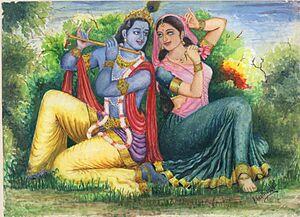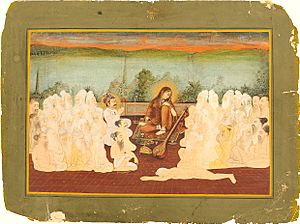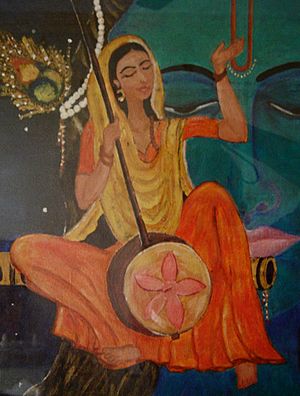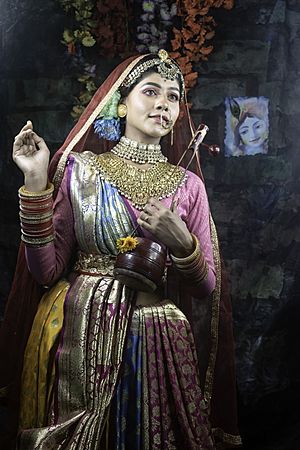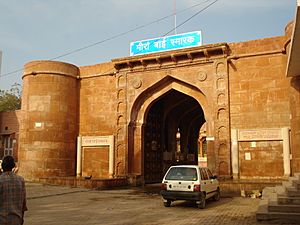Mirabai facts for kids
Quick facts for kids Mirabai |
|
|---|---|
| Religion | Hinduism |
| Known for | Poems, Bhakti for Krishna |
| Other names |
|
| Personal | |
| Born | Jashoda Rao Ratan Singh Rathore c. 1498 Kudki, Kingdom of Marwar (present-day Rajasthan, India) |
| Died | c. 1547 (aged 48–49) Dwarka, Gujarat Sultanate (present-day Gujarat, India) |
| Spouse | |
Mirabai, also known as Meera, was a very special poet and a follower of Krishna who lived in India in the 1500s. She is known as a saint and is celebrated in the Hindu tradition, especially in North India.
Mirabai was born into a royal Rajput family in a place called Kudki in what is now Rajasthan. She spent her childhood in Merta. People knew about her and loved her even by the early 1600s, as she is mentioned in an old book called Bhaktamal.
Many stories about Mirabai say that she was very brave. She didn't care about what society or her family expected. She loved Krishna so much that she thought of him as her husband. Some stories say her family tried to hurt her because of her strong religious devotion. She is the subject of many folk tales and legends, which sometimes have different details.
Millions of devotional songs praising Krishna are said to be written by Mirabai. However, scholars believe only a few hundred are truly hers. The oldest written records suggest that most of these songs were written down much later, in the 1700s. Many poems that people think are by Meera were probably written by others who admired her. These songs are called bhajans and are very popular all over India.
Some Hindu temples, like one in Chittor Fort, are dedicated to Mirabai. Her life story, though some parts are debated by historians, has been shown in movies, comic books, and other popular works today.
Contents
Mirabai's Life Story
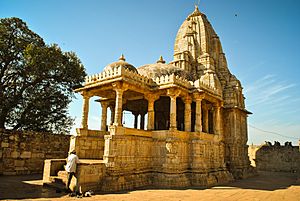
It's hard to find exact historical records about Mirabai. Scholars have tried to learn about her life from other old writings that mention her. Mirabai married Bhoj Raj, the prince of Mewar, in 1516. She didn't want to marry him. Her husband was hurt in a war in 1518 and sadly died in 1521. Her father and her father-in-law (Rana Sanga) also died shortly after a big battle in 1527.
After her father-in-law died, Vikram Singh became the new ruler of Mewar. A popular story says that Mirabai's family tried to harm her many times. For example, they sent her a glass of poison, saying it was a sweet drink. Another time, they sent her a basket with a snake instead of flowers. According to these legends, she was never hurt. The snake supposedly turned into a statue of Krishna or a garland of flowers!
The oldest writings that mention Meera are from the 1600s. These writings don't say much about her childhood or her marriage. They also don't say that her family was the one who tried to hurt her. Some experts believe that if Mirabai faced challenges, it might have been because of the political problems and wars between the Rajput kingdom and the Mughal Empire at that time.
Other stories say that Mirabai left the kingdom of Mewar and went on religious journeys. In her later years, she lived in Dwarka or Vrindavan. Legends say she magically disappeared in 1547 by merging into a statue of Krishna. While scholars don't have historical proof for miracles, it is widely agreed that Mirabai dedicated her life to Lord Krishna. She wrote many devotional songs and was one of the most important poet-saints of the Bhakti movement.
Mirabai's Poetry
Many of Mirabai's songs are still sung in India today. They are mostly devotional songs called bhajans, and almost all of them have a deep, philosophical meaning. One of her most famous songs is "Payoji maine Ram Ratan dhan payo" (पायो जी मैंने राम रतन धन पायो।, "I have received the precious jewel of the Lord's name").
Mirabai's poems are lyrical verses called padas, written in the Rajasthani language. Even though thousands of verses are said to be hers, scholars disagree on how many she actually wrote. There are no original handwritten copies of her poems from her own time. The earliest records with two poems credited to her are from the early 1700s, more than 150 years after she passed away.
Poems in Hindi and Rajasthani
The largest collection of poems linked to Mirabai comes from manuscripts written in the 1800s. Scholars try to figure out which poems are truly hers by looking at old writings that mention her, and by studying the style, language, and form of the poems. It's often a mystery when we talk about Mirabai's poetry. We can't always be sure if the poems we read today were actually written by the historical Mirabai.
In her poems, Mirabai sees Krishna as a spiritual guide and a lover. She sees herself as a devoted follower ready to join him in a spiritual union. Mirabai's writing style shows strong feelings like passion, defiance, longing, hope, joy, and the happiness of being united with Krishna. Her poems are always focused on Krishna.
Mirabai talks about her personal connection with Krishna, calling him her lover, lord, and the one who lifted the mountain. Her poem "Sanson Ki Mala Pe" shows her deep devotion to Krishna. Her poetry is known for its complete surrender to her faith. Mirabai is often grouped with other northern Sant bhaktis who spoke about Lord Sri Krishna.
Mirabai in Sikh Literature
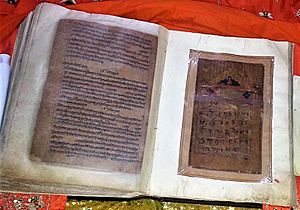
When the Adi Granth, the holy book of Sikhism, was put together in 1604, a copy was given to a Sikh named Bhai Banno. He was asked to take it to Lahore to get it bound. While doing this, he made his own copy, which included some of Mirabai's writings. However, these extra additions were not included in the final, official version of the scripture by the Sikh gurus.
Another text, Prem Ambodh Pothi, which is believed to be written by Guru Gobind Singh in 1693 CE, includes Mirabai's poetry. It lists her as one of sixteen important bhakti saints in Sikhism.
Mirabai's Compositions
- Raag Govind
- Govind Tika
- Raag Soratha
- Meera Ki Malhar
- Mira Padavali
- Narsi ji Ka Mayara
- Sanson Ki Mala Pe
Mirabai's Influence
Experts agree that Mirabai was one of the most important poet-saints of the Bhakti movement. This was a challenging time in Indian history with many religious conflicts. However, some also wonder if Mirabai became a symbol of people's suffering and their wish for a different way of life.
Mirabai continues to be influential today because of her message of freedom. She showed great determination to follow her devotion to Krishna and her spiritual beliefs, even when she faced difficulties. Her appeal in Indian culture comes from her legends and poems. She is seen as someone who "stands up for what is right and suffers greatly for holding onto her beliefs." She does this with words of love, expressing all the emotions that come with love, whether it's between people or between a person and God.
Mirabai in Popular Culture
Mirabai's life has inspired many works in popular culture. Composer John Harbison created Mirabai Songs based on her poems. There's also a documentary film about her called A Few Things I Know About Her.
Many films have been made about her life in India:
- Meera (1945), a Tamil language film starring M. S. Subbulakshmi.
- Meera (1979), a Hindi film by Gulzar.
- Other Indian films include Meerabai (1921), Sant Mirabai (1929), Rajrani Meera/Meerabai (1933), Meerabai (1936), Sadhvi Meerabai (1937), Bhakta Meera (1938), Meerabai (1940), Meera (1947), Matwali Meera (1947), Meerabai (1947), Meerabai (1947), Girdhar Gopal Ki Mira (1949), Raj Rani Meera (1956), Meera Shyam (1976), and Meera Ke Girdhar (1992).
A popular TV series with 26 episodes about her life, called Mirabai, was made by UTV in 1997. It starred Mrinal Kulkarni.
Meera, an Indian TV series from 2009 based on her life, aired on NDTV Imagine.
Shree Krishna Bhakto Meera, a 2021 Indian Bengali mythological TV series about her life, is currently airing on Star Jalsha.
Mirabai's life has also been turned into a musical story in Meera—The Lover…, a music album released in 2009.
The Meera Mahal in Merta is a museum dedicated to Mirabai. It tells her story through sculptures, paintings, and displays, and has a lovely garden.
TV Show Adaptations
The 1997 TV series Mirabai by Ved Rahi, starring Mrinal Kulkarni, is considered very true to Mirabai's life and was very popular. It had over 30 classical bhajans based on different raags, composed by Mohinderjit Singh and sung by Sandhya Rao, Kavita Krishnamurthy, and others. Its title song was sung by 40 chorus singers, which was a record at the time.
| Year | Name | Note | Played by | Channel |
|---|---|---|---|---|
| 1997 | Mirabai | 26 episodes; Director: Ved Rahi | Mrinal Kulkarni | Doordarshan |
| 2009 | Meera | 135 episodes; Directors: Mukesh Singh, Swapnil Mahaling (Shahane) | Aashika Bhatia, Aditi Sajwan | NDTV Imagine |
| 2021 - present | Shree Krishna Bhakto Meera | Director: Amit Sengupta | Arshiya Mukherjee, Debadrita Basu | Star Jalsha |
See also
 In Spanish: Mirabai para niños
In Spanish: Mirabai para niños
- Andal
- Akka Mahadevi
- Bhajan


